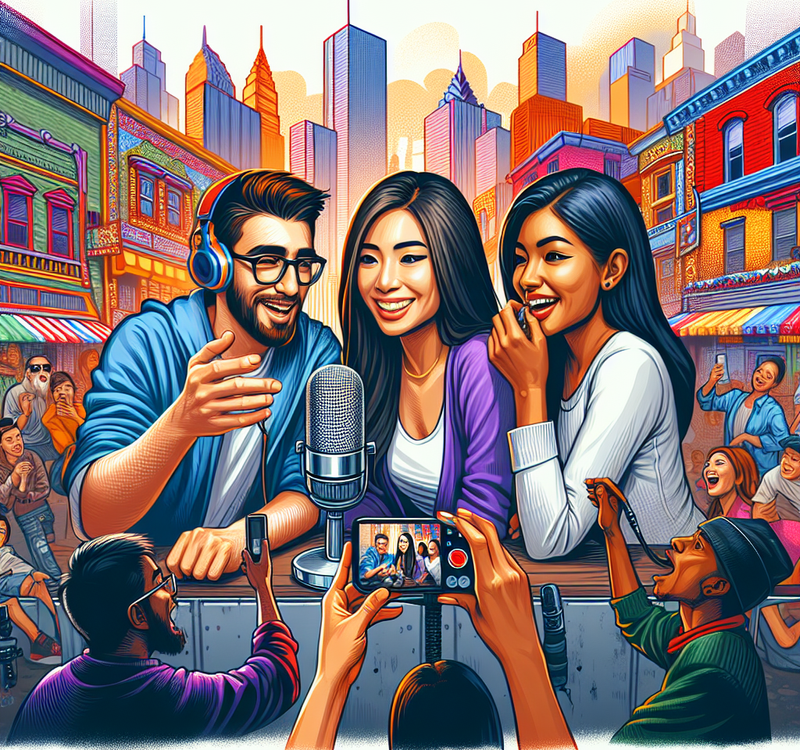
Maximizing the Impact: How to Effectively Repurpose Influencer Content
7 December، 2023
The Rise of Virtual Influencers and CGI in the Digital World
8 December، 2023The Most Popular E-commerce Stores That Utilize Influencers in Marketing

SEO-Optimized Article: The Most Popular E-commerce Stores That Utilize Influencers in Marketing
Introduction:
In today’s era of digital marketing, influencer marketing has become an essential strategy for e-commerce stores to connect with their target audience. Influencers have the power to sway consumer purchasing decisions and increase brand visibility. This article will explore the most popular e-commerce stores that effectively utilize influencers in their marketing strategies. We will delve into the brands that successfully leverage influencer collaborations, the platforms commonly used for influencer marketing, and the strategies behind their success.
Social Commerce and Influencer Marketing:
Social commerce has revolutionized the way people shop online. It is predicted to become a $1.2 trillion market worldwide by 2025, with the COVID-19 pandemic accelerating its adoption. Brands now use social commerce tools to provide personalized customer experiences on various platforms. Live shopping has emerged as a powerful tool, allowing brands to educate, engage, and sell to customers through interactive livestream events. The number of people purchasing products during such events increased by 76% globally in 2021.
Brands Utilizing Influencer Marketing:
Several e-commerce stores have successfully implemented influencer marketing strategies to engage customers and drive sales. Let’s explore some of these brands:
1. Charlotte Tilbury:
Charlotte Tilbury is a prime example of a brand that has effectively utilized influencer marketing. Through strategic collaborations with influencers, they have successfully engaged with their target audience and increased brand visibility. By teaming up with experts in the beauty industry, they establish credibility and trust among their customers.
2. Cos Bar:
Cos Bar, a high-end beauty retailer, has leveraged influencer partnerships and user-generated content to create a sense of community around their brand. By collaborating with influencers, they encourage customer participation and generate a loyal customer base. Their community-driven approach has attracted a niche audience of beauty enthusiasts.
3. Lolli & Pops:
Lolli & Pops, a specialty candy retailer, has used social media platforms to create a seamless shopping experience for customers. By allowing customers to browse and purchase products directly from their social media pages, they simplify the purchasing process. Additionally, they utilize influencer collaborations and user-generated content to engage with their audience and drive sales.
4. The Lip Bar:
The Lip Bar, a black-owned beauty brand, has embraced social commerce and influencer marketing to expand their reach. They leverage user-generated content and engage with customers through live events and Q&A sessions. By utilizing influencers, they create a trusted and relatable image that resonates with their target audience.
Platforms for Influencer Marketing:
Now that we’ve explored how brands use influencer marketing, let’s examine the most commonly used platforms for these campaigns:
1. Instagram:
Instagram is the leading platform for influencer marketing. With over 1 billion active users, it offers a vast audience for brands to tap into. The platform’s visual nature makes it ideal for showcasing products and collaborating with influencers. Influencers can create engaging content, leverage Instagram Stories and Reels, and incorporate shoppable tags to drive conversions.
2. YouTube:
YouTube is another powerful platform for influencer marketing. Video content allows influencers to demonstrate products and provide in-depth reviews. Brands often collaborate with YouTube influencers to reach a wider audience and benefit from their expertise. YouTube influencers have a loyal following and can showcase products effectively through tutorials and recommendations.
3. TikTok:
TikTok has gained immense popularity, especially among younger demographics. Brands are starting to tap into the platform’s potential by collaborating with TikTok influencers. By creating short, engaging videos, brands can drive brand awareness and generate interest in their products. TikTok’s algorithm also helps content reach a wider audience, making it an effective platform for influencer marketing.
Influencer Marketing Strategy for E-commerce:
To have a successful influencer marketing campaign, e-commerce stores need to strategize their approach. Here are some key factors to consider:
1. Clear Objectives:
Defining clear objectives is crucial for any influencer marketing campaign. These objectives could include increasing brand awareness, driving sales, or reaching a specific target audience. By aligning the campaign with specific goals, brands can effectively measure the success of their influencer collaborations.
2. Targeted Influencer Selection:
Choosing the right influencers is essential for the success of the campaign. Brands should consider influencers who align with their target audience and brand values. Conduct thorough research to ensure that the influencer’s audience demographics and engagement align with the brand’s target market.
3. Authenticity and Creativity:
Authenticity is key in influencer marketing. Brands should allow influencers creative freedom to promote products in a way that feels genuine to their audience. By encouraging authenticity, brands can build trust with the influencer’s followers and increase the likelihood of successful conversions.
4. Measuring Campaign Success:
To gauge the success of their influencer marketing campaign, brands should establish key performance indicators (KPIs) and track relevant metrics. This will provide valuable insights into the campaign’s impact and help improve future strategies.
Conclusion:
Influencer marketing has become an essential tool for e-commerce stores to connect with their target audience. Through strategic collaborations with influencers on platforms like Instagram, YouTube, and TikTok, brands can engage customers and drive sales. The success of influencer marketing campaigns relies on clear objectives, targeted influencer selection, authenticity, and measuring campaign success.
Araboost as a Solution:
For e-commerce stores looking to streamline their influencer marketing efforts, Araboost is an ideal solution. Araboost is a cutting-edge influencer marketing platform designed specifically for the MENA region. It offers advertisers an effortless and seamless experience comparable to running ads on major digital ad platforms like Google and Facebook. With Araboost, brands can automate influencer selection, campaign management, and performance estimation. This streamlines the influencer marketing process, saving time and maximizing results. Visit Araboost at [https://araboost.com] to learn more.
Keywords: brand uses influencer marketing, influencer marketing platforms, influencer marketing strategy for e-commerce, e-commerce influencers on Instagram, influencer ecommerce platform, top ecommerce influencers, e-commerce influencers in Europe, ecommerce influencers UK, social commerce store, top ecommerce experts, best influencer marketing campaigns.
FAQs:
1. What are the benefits of influencer marketing for e-commerce stores?
2. How can e-commerce stores measure the success of their influencer marketing campaigns?
3. Which social media platforms are most effective for influencer marketing?
4. How can brands ensure authenticity in their influencer marketing collaborations?
5. How does Araboost simplify influencer marketing for e-commerce stores?



